Organisational Behaviour Report: Culture, Motivation, Teams - BBC
VerifiedAdded on 2020/06/06
|13
|3804
|134
Report
AI Summary
This report provides a comprehensive analysis of organisational behaviour, using the British Broadcasting Corporation (BBC) as a case study. It begins with an introduction to organisational behaviour and then delves into Handy's cultural typology, exploring how culture, politics, and power influence individuals and teams within the BBC. The report then examines process theories of motivation and motivational techniques, discussing their importance and application within the BBC to achieve its goals. It further explores different types of teams in the BBC and what constitutes an effective team. Finally, it addresses theories of organisational behaviour and identifies barriers affecting performance within the BBC, drawing on concepts like the Path-Goal Theory and other relevant factors impacting individuals and team efforts. The report concludes with a summary of the key findings and insights.
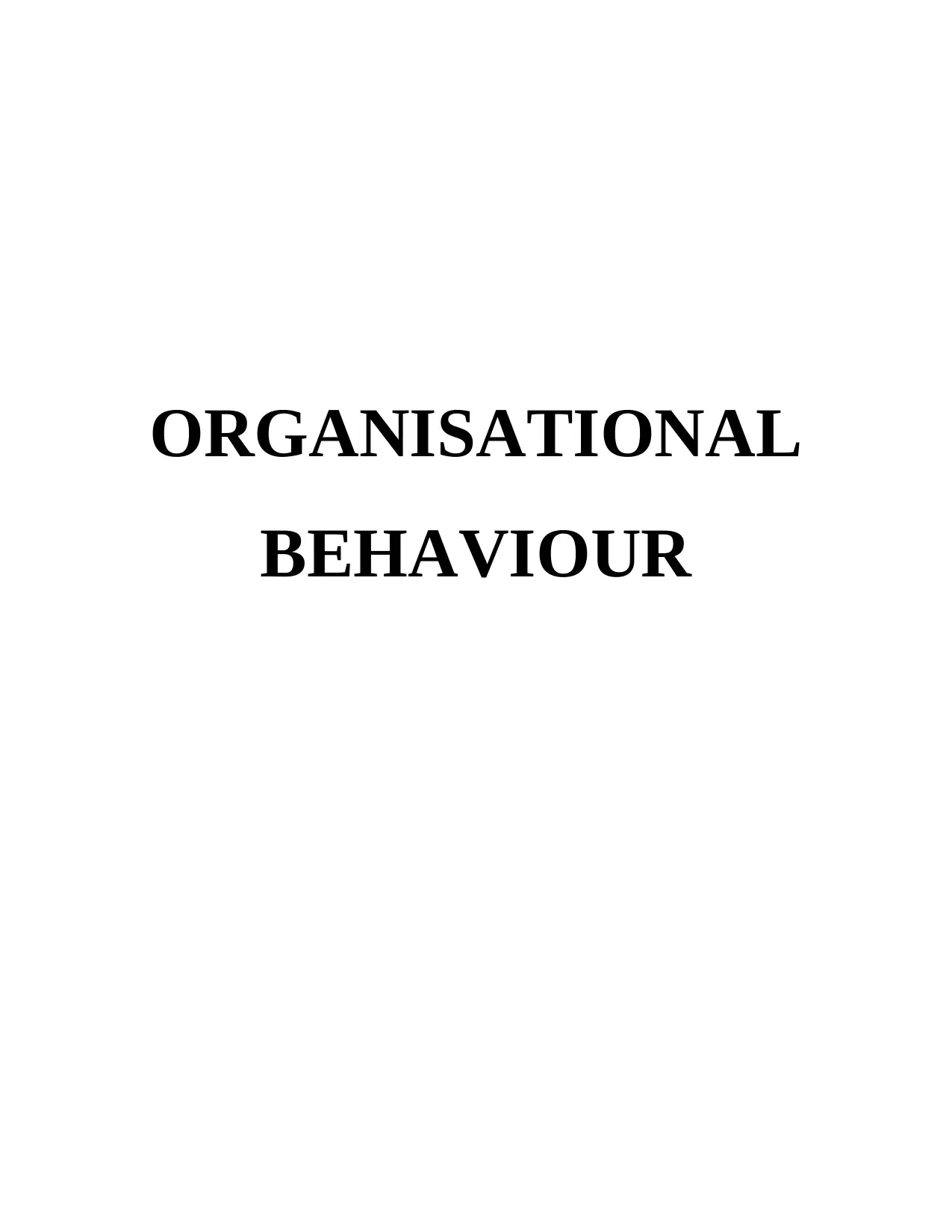
ORGANISATIONAL
BEHAVIOUR
BEHAVIOUR
Paraphrase This Document
Need a fresh take? Get an instant paraphrase of this document with our AI Paraphraser
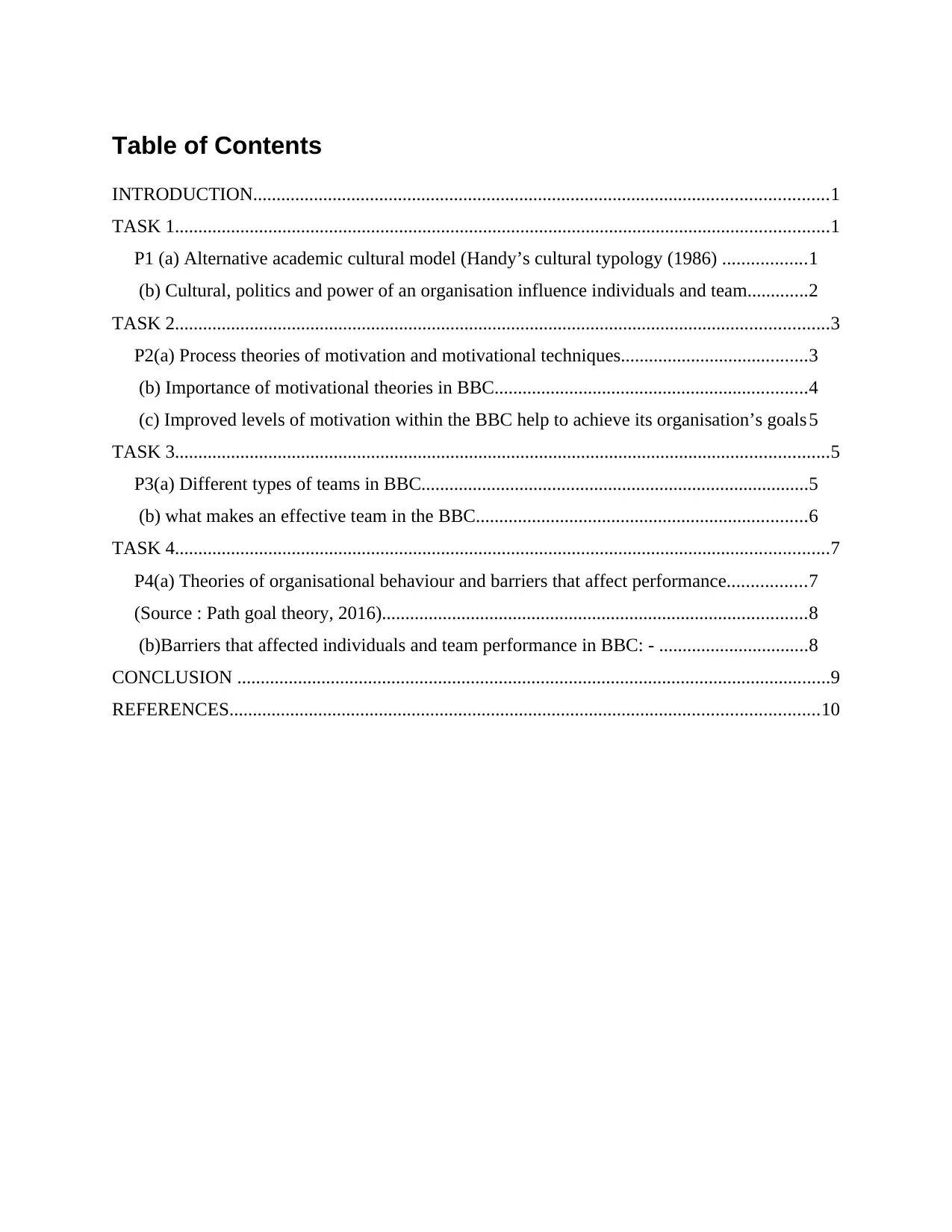
Table of Contents
INTRODUCTION...........................................................................................................................1
TASK 1............................................................................................................................................1
P1 (a) Alternative academic cultural model (Handy’s cultural typology (1986) ..................1
(b) Cultural, politics and power of an organisation influence individuals and team.............2
TASK 2............................................................................................................................................3
P2(a) Process theories of motivation and motivational techniques........................................3
(b) Importance of motivational theories in BBC...................................................................4
(c) Improved levels of motivation within the BBC help to achieve its organisation’s goals 5
TASK 3............................................................................................................................................5
P3(a) Different types of teams in BBC...................................................................................5
(b) what makes an effective team in the BBC.......................................................................6
TASK 4............................................................................................................................................7
P4(a) Theories of organisational behaviour and barriers that affect performance.................7
(Source : Path goal theory, 2016)...........................................................................................8
(b)Barriers that affected individuals and team performance in BBC: - ................................8
CONCLUSION ...............................................................................................................................9
REFERENCES..............................................................................................................................10
INTRODUCTION...........................................................................................................................1
TASK 1............................................................................................................................................1
P1 (a) Alternative academic cultural model (Handy’s cultural typology (1986) ..................1
(b) Cultural, politics and power of an organisation influence individuals and team.............2
TASK 2............................................................................................................................................3
P2(a) Process theories of motivation and motivational techniques........................................3
(b) Importance of motivational theories in BBC...................................................................4
(c) Improved levels of motivation within the BBC help to achieve its organisation’s goals 5
TASK 3............................................................................................................................................5
P3(a) Different types of teams in BBC...................................................................................5
(b) what makes an effective team in the BBC.......................................................................6
TASK 4............................................................................................................................................7
P4(a) Theories of organisational behaviour and barriers that affect performance.................7
(Source : Path goal theory, 2016)...........................................................................................8
(b)Barriers that affected individuals and team performance in BBC: - ................................8
CONCLUSION ...............................................................................................................................9
REFERENCES..............................................................................................................................10
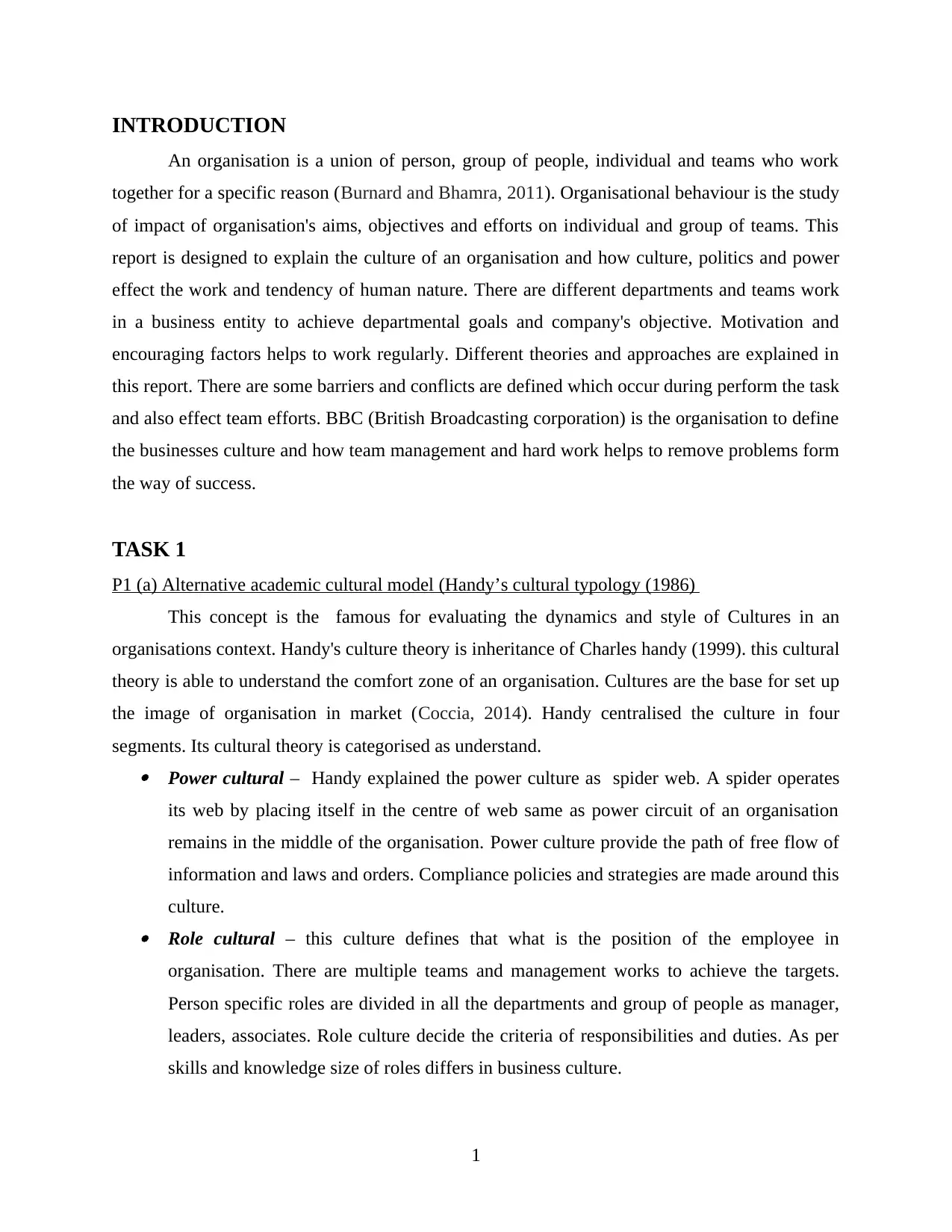
INTRODUCTION
An organisation is a union of person, group of people, individual and teams who work
together for a specific reason (Burnard and Bhamra, 2011). Organisational behaviour is the study
of impact of organisation's aims, objectives and efforts on individual and group of teams. This
report is designed to explain the culture of an organisation and how culture, politics and power
effect the work and tendency of human nature. There are different departments and teams work
in a business entity to achieve departmental goals and company's objective. Motivation and
encouraging factors helps to work regularly. Different theories and approaches are explained in
this report. There are some barriers and conflicts are defined which occur during perform the task
and also effect team efforts. BBC (British Broadcasting corporation) is the organisation to define
the businesses culture and how team management and hard work helps to remove problems form
the way of success.
TASK 1
P1 (a) Alternative academic cultural model (Handy’s cultural typology (1986)
This concept is the famous for evaluating the dynamics and style of Cultures in an
organisations context. Handy's culture theory is inheritance of Charles handy (1999). this cultural
theory is able to understand the comfort zone of an organisation. Cultures are the base for set up
the image of organisation in market (Coccia, 2014). Handy centralised the culture in four
segments. Its cultural theory is categorised as understand. Power cultural – Handy explained the power culture as spider web. A spider operates
its web by placing itself in the centre of web same as power circuit of an organisation
remains in the middle of the organisation. Power culture provide the path of free flow of
information and laws and orders. Compliance policies and strategies are made around this
culture. Role cultural – this culture defines that what is the position of the employee in
organisation. There are multiple teams and management works to achieve the targets.
Person specific roles are divided in all the departments and group of people as manager,
leaders, associates. Role culture decide the criteria of responsibilities and duties. As per
skills and knowledge size of roles differs in business culture.
1
An organisation is a union of person, group of people, individual and teams who work
together for a specific reason (Burnard and Bhamra, 2011). Organisational behaviour is the study
of impact of organisation's aims, objectives and efforts on individual and group of teams. This
report is designed to explain the culture of an organisation and how culture, politics and power
effect the work and tendency of human nature. There are different departments and teams work
in a business entity to achieve departmental goals and company's objective. Motivation and
encouraging factors helps to work regularly. Different theories and approaches are explained in
this report. There are some barriers and conflicts are defined which occur during perform the task
and also effect team efforts. BBC (British Broadcasting corporation) is the organisation to define
the businesses culture and how team management and hard work helps to remove problems form
the way of success.
TASK 1
P1 (a) Alternative academic cultural model (Handy’s cultural typology (1986)
This concept is the famous for evaluating the dynamics and style of Cultures in an
organisations context. Handy's culture theory is inheritance of Charles handy (1999). this cultural
theory is able to understand the comfort zone of an organisation. Cultures are the base for set up
the image of organisation in market (Coccia, 2014). Handy centralised the culture in four
segments. Its cultural theory is categorised as understand. Power cultural – Handy explained the power culture as spider web. A spider operates
its web by placing itself in the centre of web same as power circuit of an organisation
remains in the middle of the organisation. Power culture provide the path of free flow of
information and laws and orders. Compliance policies and strategies are made around this
culture. Role cultural – this culture defines that what is the position of the employee in
organisation. There are multiple teams and management works to achieve the targets.
Person specific roles are divided in all the departments and group of people as manager,
leaders, associates. Role culture decide the criteria of responsibilities and duties. As per
skills and knowledge size of roles differs in business culture.
1
⊘ This is a preview!⊘
Do you want full access?
Subscribe today to unlock all pages.

Trusted by 1+ million students worldwide
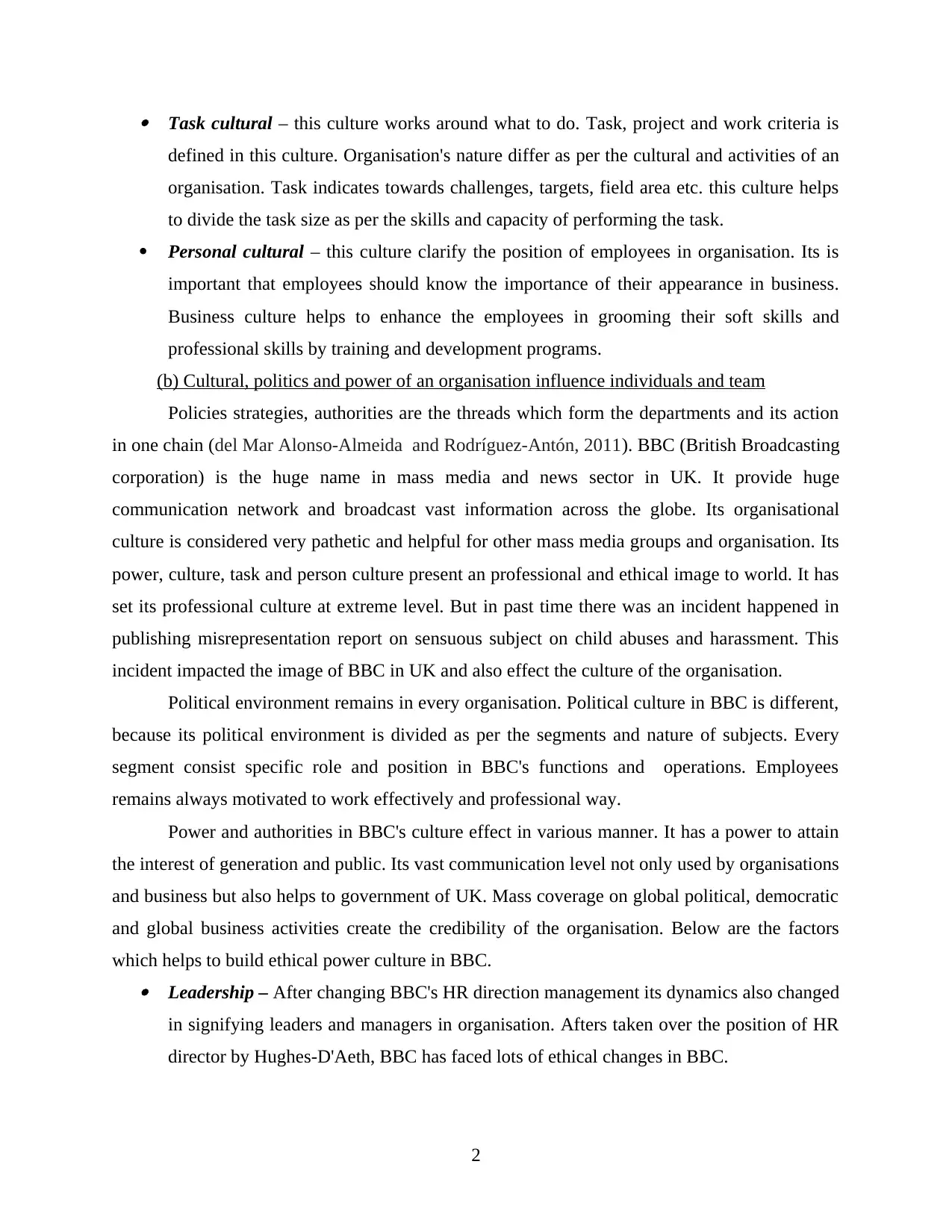
Task cultural – this culture works around what to do. Task, project and work criteria is
defined in this culture. Organisation's nature differ as per the cultural and activities of an
organisation. Task indicates towards challenges, targets, field area etc. this culture helps
to divide the task size as per the skills and capacity of performing the task.
Personal cultural – this culture clarify the position of employees in organisation. Its is
important that employees should know the importance of their appearance in business.
Business culture helps to enhance the employees in grooming their soft skills and
professional skills by training and development programs.
(b) Cultural, politics and power of an organisation influence individuals and team
Policies strategies, authorities are the threads which form the departments and its action
in one chain (del Mar Alonso-Almeida and Rodríguez-Antón, 2011). BBC (British Broadcasting
corporation) is the huge name in mass media and news sector in UK. It provide huge
communication network and broadcast vast information across the globe. Its organisational
culture is considered very pathetic and helpful for other mass media groups and organisation. Its
power, culture, task and person culture present an professional and ethical image to world. It has
set its professional culture at extreme level. But in past time there was an incident happened in
publishing misrepresentation report on sensuous subject on child abuses and harassment. This
incident impacted the image of BBC in UK and also effect the culture of the organisation.
Political environment remains in every organisation. Political culture in BBC is different,
because its political environment is divided as per the segments and nature of subjects. Every
segment consist specific role and position in BBC's functions and operations. Employees
remains always motivated to work effectively and professional way.
Power and authorities in BBC's culture effect in various manner. It has a power to attain
the interest of generation and public. Its vast communication level not only used by organisations
and business but also helps to government of UK. Mass coverage on global political, democratic
and global business activities create the credibility of the organisation. Below are the factors
which helps to build ethical power culture in BBC. Leadership – After changing BBC's HR direction management its dynamics also changed
in signifying leaders and managers in organisation. Afters taken over the position of HR
director by Hughes-D'Aeth, BBC has faced lots of ethical changes in BBC.
2
defined in this culture. Organisation's nature differ as per the cultural and activities of an
organisation. Task indicates towards challenges, targets, field area etc. this culture helps
to divide the task size as per the skills and capacity of performing the task.
Personal cultural – this culture clarify the position of employees in organisation. Its is
important that employees should know the importance of their appearance in business.
Business culture helps to enhance the employees in grooming their soft skills and
professional skills by training and development programs.
(b) Cultural, politics and power of an organisation influence individuals and team
Policies strategies, authorities are the threads which form the departments and its action
in one chain (del Mar Alonso-Almeida and Rodríguez-Antón, 2011). BBC (British Broadcasting
corporation) is the huge name in mass media and news sector in UK. It provide huge
communication network and broadcast vast information across the globe. Its organisational
culture is considered very pathetic and helpful for other mass media groups and organisation. Its
power, culture, task and person culture present an professional and ethical image to world. It has
set its professional culture at extreme level. But in past time there was an incident happened in
publishing misrepresentation report on sensuous subject on child abuses and harassment. This
incident impacted the image of BBC in UK and also effect the culture of the organisation.
Political environment remains in every organisation. Political culture in BBC is different,
because its political environment is divided as per the segments and nature of subjects. Every
segment consist specific role and position in BBC's functions and operations. Employees
remains always motivated to work effectively and professional way.
Power and authorities in BBC's culture effect in various manner. It has a power to attain
the interest of generation and public. Its vast communication level not only used by organisations
and business but also helps to government of UK. Mass coverage on global political, democratic
and global business activities create the credibility of the organisation. Below are the factors
which helps to build ethical power culture in BBC. Leadership – After changing BBC's HR direction management its dynamics also changed
in signifying leaders and managers in organisation. Afters taken over the position of HR
director by Hughes-D'Aeth, BBC has faced lots of ethical changes in BBC.
2
Paraphrase This Document
Need a fresh take? Get an instant paraphrase of this document with our AI Paraphraser
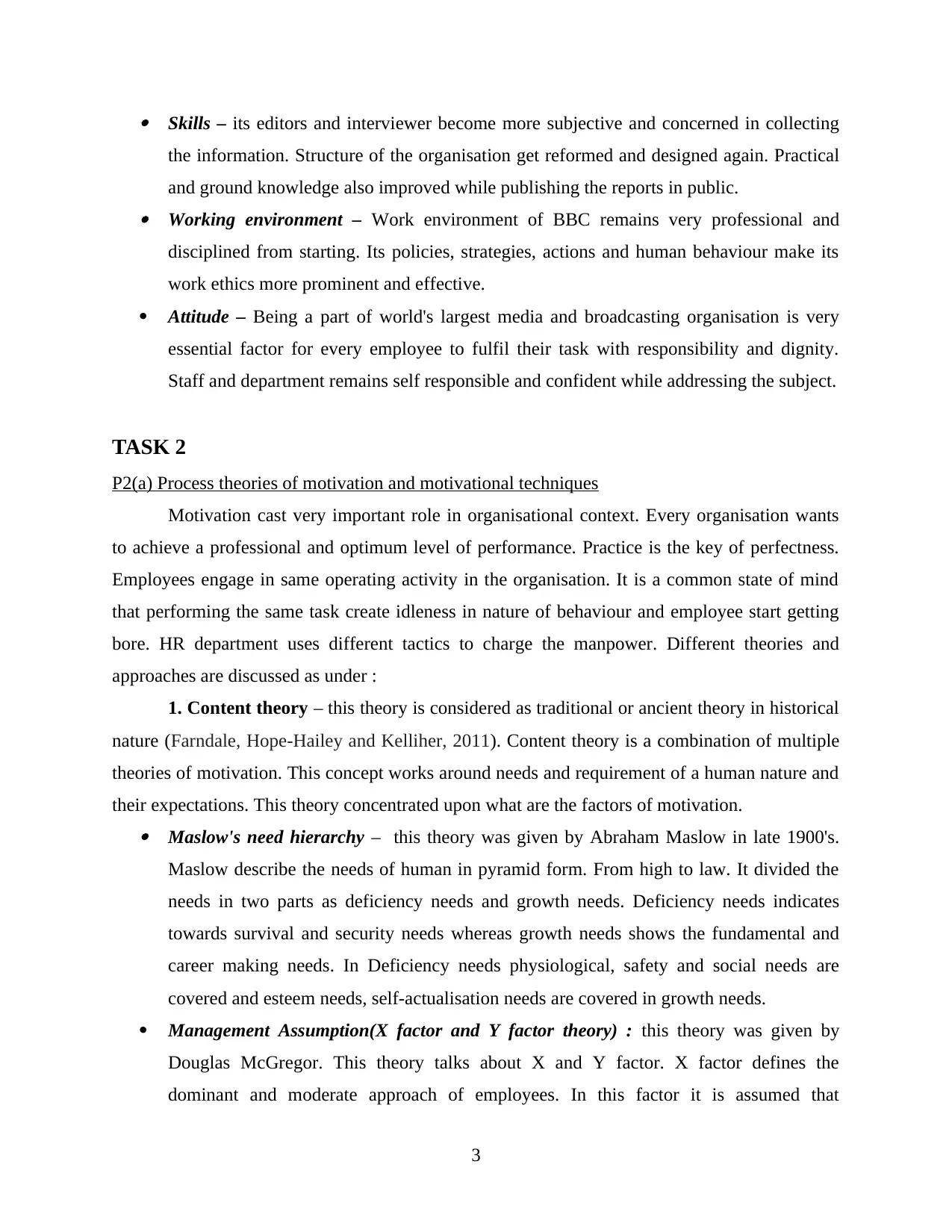
Skills – its editors and interviewer become more subjective and concerned in collecting
the information. Structure of the organisation get reformed and designed again. Practical
and ground knowledge also improved while publishing the reports in public. Working environment – Work environment of BBC remains very professional and
disciplined from starting. Its policies, strategies, actions and human behaviour make its
work ethics more prominent and effective.
Attitude – Being a part of world's largest media and broadcasting organisation is very
essential factor for every employee to fulfil their task with responsibility and dignity.
Staff and department remains self responsible and confident while addressing the subject.
TASK 2
P2(a) Process theories of motivation and motivational techniques
Motivation cast very important role in organisational context. Every organisation wants
to achieve a professional and optimum level of performance. Practice is the key of perfectness.
Employees engage in same operating activity in the organisation. It is a common state of mind
that performing the same task create idleness in nature of behaviour and employee start getting
bore. HR department uses different tactics to charge the manpower. Different theories and
approaches are discussed as under :
1. Content theory – this theory is considered as traditional or ancient theory in historical
nature (Farndale, Hope-Hailey and Kelliher, 2011). Content theory is a combination of multiple
theories of motivation. This concept works around needs and requirement of a human nature and
their expectations. This theory concentrated upon what are the factors of motivation. Maslow's need hierarchy – this theory was given by Abraham Maslow in late 1900's.
Maslow describe the needs of human in pyramid form. From high to law. It divided the
needs in two parts as deficiency needs and growth needs. Deficiency needs indicates
towards survival and security needs whereas growth needs shows the fundamental and
career making needs. In Deficiency needs physiological, safety and social needs are
covered and esteem needs, self-actualisation needs are covered in growth needs.
Management Assumption(X factor and Y factor theory) : this theory was given by
Douglas McGregor. This theory talks about X and Y factor. X factor defines the
dominant and moderate approach of employees. In this factor it is assumed that
3
the information. Structure of the organisation get reformed and designed again. Practical
and ground knowledge also improved while publishing the reports in public. Working environment – Work environment of BBC remains very professional and
disciplined from starting. Its policies, strategies, actions and human behaviour make its
work ethics more prominent and effective.
Attitude – Being a part of world's largest media and broadcasting organisation is very
essential factor for every employee to fulfil their task with responsibility and dignity.
Staff and department remains self responsible and confident while addressing the subject.
TASK 2
P2(a) Process theories of motivation and motivational techniques
Motivation cast very important role in organisational context. Every organisation wants
to achieve a professional and optimum level of performance. Practice is the key of perfectness.
Employees engage in same operating activity in the organisation. It is a common state of mind
that performing the same task create idleness in nature of behaviour and employee start getting
bore. HR department uses different tactics to charge the manpower. Different theories and
approaches are discussed as under :
1. Content theory – this theory is considered as traditional or ancient theory in historical
nature (Farndale, Hope-Hailey and Kelliher, 2011). Content theory is a combination of multiple
theories of motivation. This concept works around needs and requirement of a human nature and
their expectations. This theory concentrated upon what are the factors of motivation. Maslow's need hierarchy – this theory was given by Abraham Maslow in late 1900's.
Maslow describe the needs of human in pyramid form. From high to law. It divided the
needs in two parts as deficiency needs and growth needs. Deficiency needs indicates
towards survival and security needs whereas growth needs shows the fundamental and
career making needs. In Deficiency needs physiological, safety and social needs are
covered and esteem needs, self-actualisation needs are covered in growth needs.
Management Assumption(X factor and Y factor theory) : this theory was given by
Douglas McGregor. This theory talks about X and Y factor. X factor defines the
dominant and moderate approach of employees. In this factor it is assumed that
3
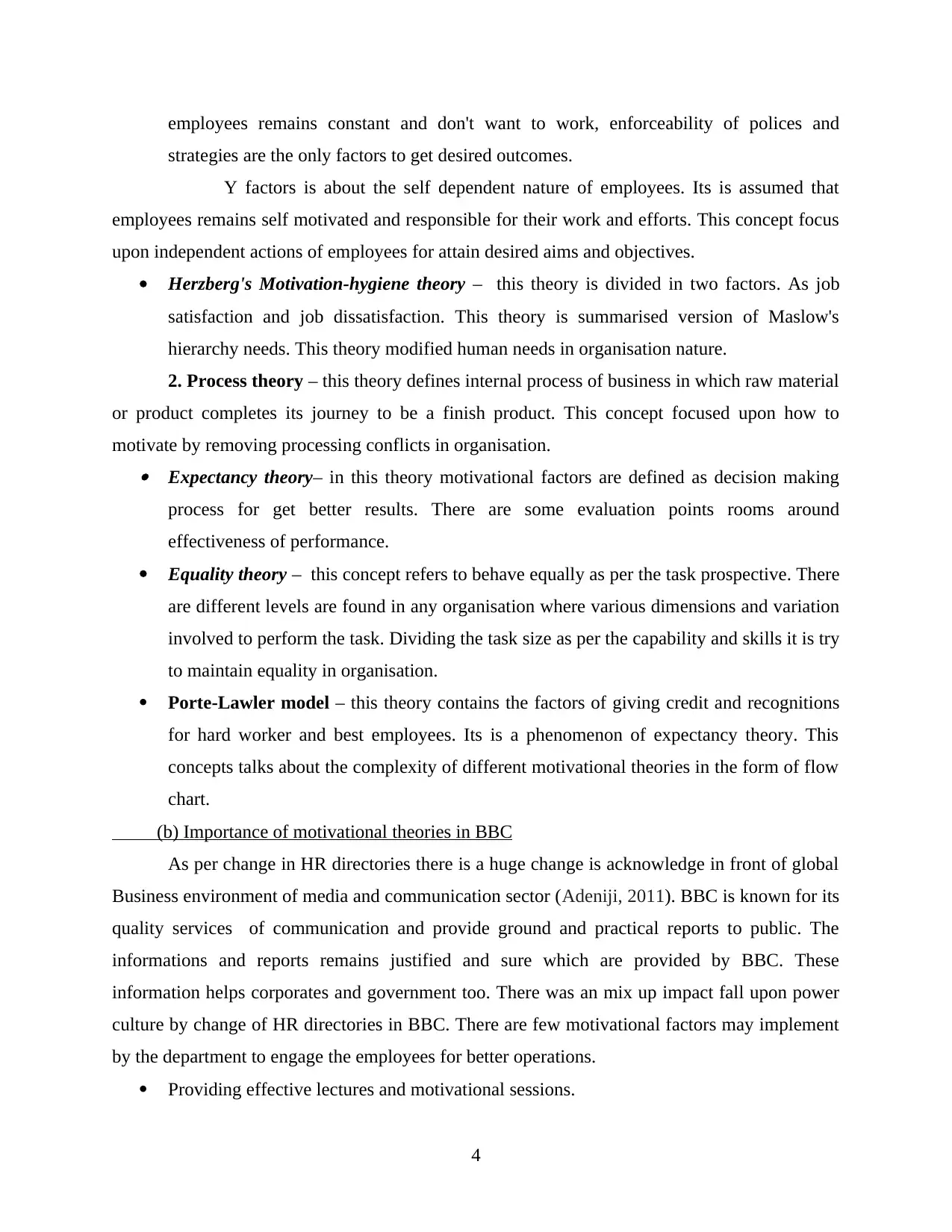
employees remains constant and don't want to work, enforceability of polices and
strategies are the only factors to get desired outcomes.
Y factors is about the self dependent nature of employees. Its is assumed that
employees remains self motivated and responsible for their work and efforts. This concept focus
upon independent actions of employees for attain desired aims and objectives.
Herzberg's Motivation-hygiene theory – this theory is divided in two factors. As job
satisfaction and job dissatisfaction. This theory is summarised version of Maslow's
hierarchy needs. This theory modified human needs in organisation nature.
2. Process theory – this theory defines internal process of business in which raw material
or product completes its journey to be a finish product. This concept focused upon how to
motivate by removing processing conflicts in organisation. Expectancy theory– in this theory motivational factors are defined as decision making
process for get better results. There are some evaluation points rooms around
effectiveness of performance.
Equality theory – this concept refers to behave equally as per the task prospective. There
are different levels are found in any organisation where various dimensions and variation
involved to perform the task. Dividing the task size as per the capability and skills it is try
to maintain equality in organisation.
Porte-Lawler model – this theory contains the factors of giving credit and recognitions
for hard worker and best employees. Its is a phenomenon of expectancy theory. This
concepts talks about the complexity of different motivational theories in the form of flow
chart.
(b) Importance of motivational theories in BBC
As per change in HR directories there is a huge change is acknowledge in front of global
Business environment of media and communication sector (Adeniji, 2011). BBC is known for its
quality services of communication and provide ground and practical reports to public. The
informations and reports remains justified and sure which are provided by BBC. These
information helps corporates and government too. There was an mix up impact fall upon power
culture by change of HR directories in BBC. There are few motivational factors may implement
by the department to engage the employees for better operations.
Providing effective lectures and motivational sessions.
4
strategies are the only factors to get desired outcomes.
Y factors is about the self dependent nature of employees. Its is assumed that
employees remains self motivated and responsible for their work and efforts. This concept focus
upon independent actions of employees for attain desired aims and objectives.
Herzberg's Motivation-hygiene theory – this theory is divided in two factors. As job
satisfaction and job dissatisfaction. This theory is summarised version of Maslow's
hierarchy needs. This theory modified human needs in organisation nature.
2. Process theory – this theory defines internal process of business in which raw material
or product completes its journey to be a finish product. This concept focused upon how to
motivate by removing processing conflicts in organisation. Expectancy theory– in this theory motivational factors are defined as decision making
process for get better results. There are some evaluation points rooms around
effectiveness of performance.
Equality theory – this concept refers to behave equally as per the task prospective. There
are different levels are found in any organisation where various dimensions and variation
involved to perform the task. Dividing the task size as per the capability and skills it is try
to maintain equality in organisation.
Porte-Lawler model – this theory contains the factors of giving credit and recognitions
for hard worker and best employees. Its is a phenomenon of expectancy theory. This
concepts talks about the complexity of different motivational theories in the form of flow
chart.
(b) Importance of motivational theories in BBC
As per change in HR directories there is a huge change is acknowledge in front of global
Business environment of media and communication sector (Adeniji, 2011). BBC is known for its
quality services of communication and provide ground and practical reports to public. The
informations and reports remains justified and sure which are provided by BBC. These
information helps corporates and government too. There was an mix up impact fall upon power
culture by change of HR directories in BBC. There are few motivational factors may implement
by the department to engage the employees for better operations.
Providing effective lectures and motivational sessions.
4
⊘ This is a preview!⊘
Do you want full access?
Subscribe today to unlock all pages.

Trusted by 1+ million students worldwide
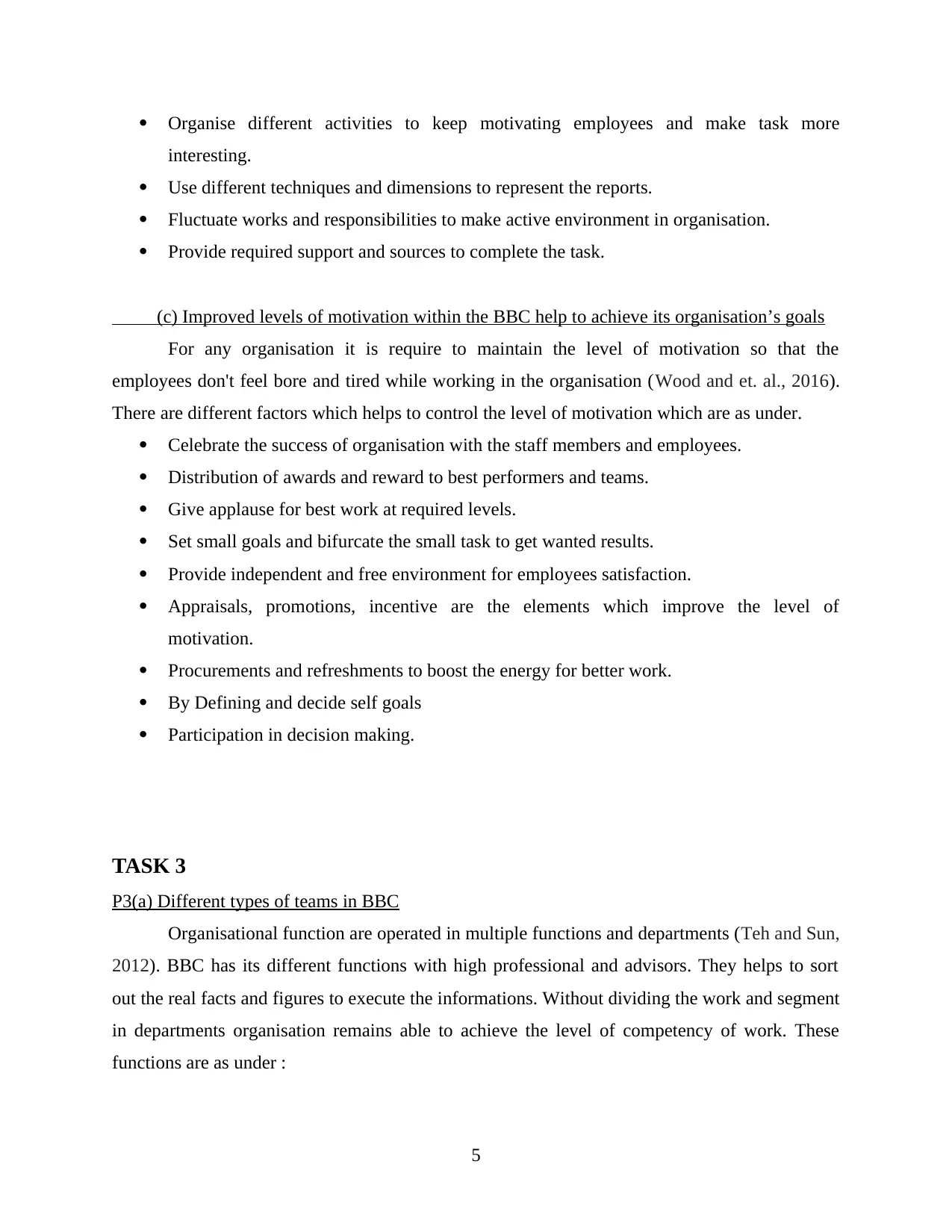
Organise different activities to keep motivating employees and make task more
interesting.
Use different techniques and dimensions to represent the reports.
Fluctuate works and responsibilities to make active environment in organisation.
Provide required support and sources to complete the task.
(c) Improved levels of motivation within the BBC help to achieve its organisation’s goals
For any organisation it is require to maintain the level of motivation so that the
employees don't feel bore and tired while working in the organisation (Wood and et. al., 2016).
There are different factors which helps to control the level of motivation which are as under.
Celebrate the success of organisation with the staff members and employees.
Distribution of awards and reward to best performers and teams.
Give applause for best work at required levels.
Set small goals and bifurcate the small task to get wanted results.
Provide independent and free environment for employees satisfaction.
Appraisals, promotions, incentive are the elements which improve the level of
motivation.
Procurements and refreshments to boost the energy for better work.
By Defining and decide self goals
Participation in decision making.
TASK 3
P3(a) Different types of teams in BBC
Organisational function are operated in multiple functions and departments (Teh and Sun,
2012). BBC has its different functions with high professional and advisors. They helps to sort
out the real facts and figures to execute the informations. Without dividing the work and segment
in departments organisation remains able to achieve the level of competency of work. These
functions are as under :
5
interesting.
Use different techniques and dimensions to represent the reports.
Fluctuate works and responsibilities to make active environment in organisation.
Provide required support and sources to complete the task.
(c) Improved levels of motivation within the BBC help to achieve its organisation’s goals
For any organisation it is require to maintain the level of motivation so that the
employees don't feel bore and tired while working in the organisation (Wood and et. al., 2016).
There are different factors which helps to control the level of motivation which are as under.
Celebrate the success of organisation with the staff members and employees.
Distribution of awards and reward to best performers and teams.
Give applause for best work at required levels.
Set small goals and bifurcate the small task to get wanted results.
Provide independent and free environment for employees satisfaction.
Appraisals, promotions, incentive are the elements which improve the level of
motivation.
Procurements and refreshments to boost the energy for better work.
By Defining and decide self goals
Participation in decision making.
TASK 3
P3(a) Different types of teams in BBC
Organisational function are operated in multiple functions and departments (Teh and Sun,
2012). BBC has its different functions with high professional and advisors. They helps to sort
out the real facts and figures to execute the informations. Without dividing the work and segment
in departments organisation remains able to achieve the level of competency of work. These
functions are as under :
5
Paraphrase This Document
Need a fresh take? Get an instant paraphrase of this document with our AI Paraphraser
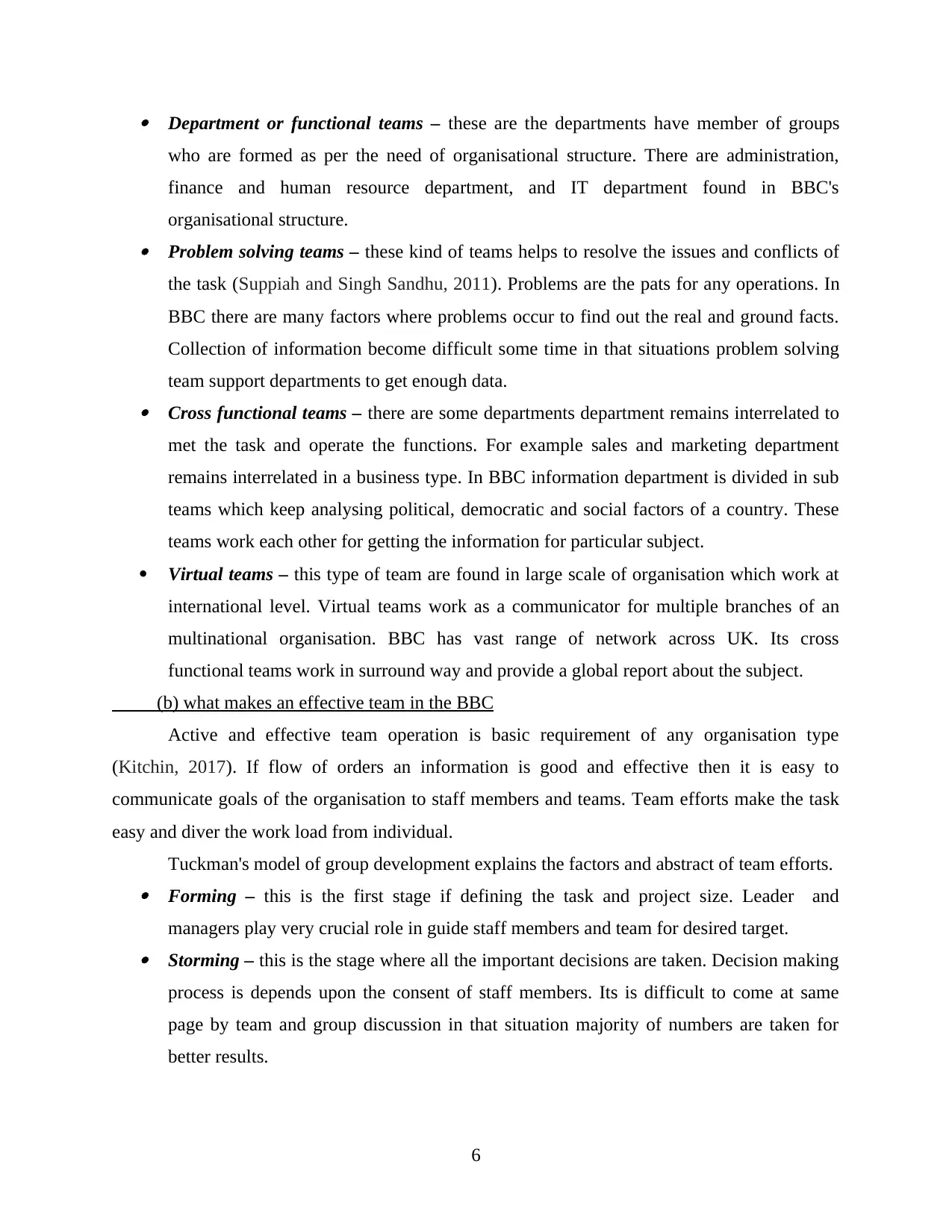
Department or functional teams – these are the departments have member of groups
who are formed as per the need of organisational structure. There are administration,
finance and human resource department, and IT department found in BBC's
organisational structure. Problem solving teams – these kind of teams helps to resolve the issues and conflicts of
the task (Suppiah and Singh Sandhu, 2011). Problems are the pats for any operations. In
BBC there are many factors where problems occur to find out the real and ground facts.
Collection of information become difficult some time in that situations problem solving
team support departments to get enough data. Cross functional teams – there are some departments department remains interrelated to
met the task and operate the functions. For example sales and marketing department
remains interrelated in a business type. In BBC information department is divided in sub
teams which keep analysing political, democratic and social factors of a country. These
teams work each other for getting the information for particular subject.
Virtual teams – this type of team are found in large scale of organisation which work at
international level. Virtual teams work as a communicator for multiple branches of an
multinational organisation. BBC has vast range of network across UK. Its cross
functional teams work in surround way and provide a global report about the subject.
(b) what makes an effective team in the BBC
Active and effective team operation is basic requirement of any organisation type
(Kitchin, 2017). If flow of orders an information is good and effective then it is easy to
communicate goals of the organisation to staff members and teams. Team efforts make the task
easy and diver the work load from individual.
Tuckman's model of group development explains the factors and abstract of team efforts. Forming – this is the first stage if defining the task and project size. Leader and
managers play very crucial role in guide staff members and team for desired target. Storming – this is the stage where all the important decisions are taken. Decision making
process is depends upon the consent of staff members. Its is difficult to come at same
page by team and group discussion in that situation majority of numbers are taken for
better results.
6
who are formed as per the need of organisational structure. There are administration,
finance and human resource department, and IT department found in BBC's
organisational structure. Problem solving teams – these kind of teams helps to resolve the issues and conflicts of
the task (Suppiah and Singh Sandhu, 2011). Problems are the pats for any operations. In
BBC there are many factors where problems occur to find out the real and ground facts.
Collection of information become difficult some time in that situations problem solving
team support departments to get enough data. Cross functional teams – there are some departments department remains interrelated to
met the task and operate the functions. For example sales and marketing department
remains interrelated in a business type. In BBC information department is divided in sub
teams which keep analysing political, democratic and social factors of a country. These
teams work each other for getting the information for particular subject.
Virtual teams – this type of team are found in large scale of organisation which work at
international level. Virtual teams work as a communicator for multiple branches of an
multinational organisation. BBC has vast range of network across UK. Its cross
functional teams work in surround way and provide a global report about the subject.
(b) what makes an effective team in the BBC
Active and effective team operation is basic requirement of any organisation type
(Kitchin, 2017). If flow of orders an information is good and effective then it is easy to
communicate goals of the organisation to staff members and teams. Team efforts make the task
easy and diver the work load from individual.
Tuckman's model of group development explains the factors and abstract of team efforts. Forming – this is the first stage if defining the task and project size. Leader and
managers play very crucial role in guide staff members and team for desired target. Storming – this is the stage where all the important decisions are taken. Decision making
process is depends upon the consent of staff members. Its is difficult to come at same
page by team and group discussion in that situation majority of numbers are taken for
better results.
6
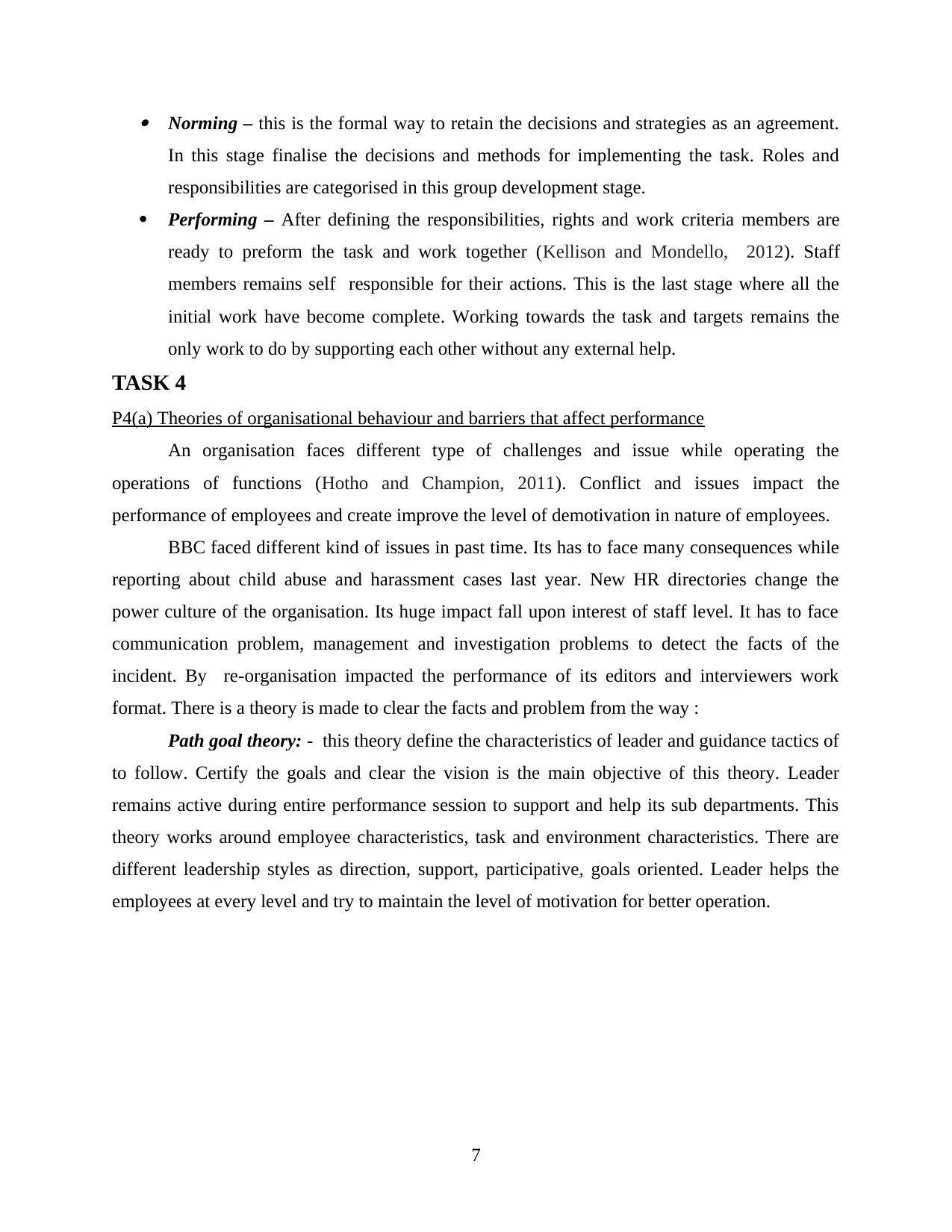
Norming – this is the formal way to retain the decisions and strategies as an agreement.
In this stage finalise the decisions and methods for implementing the task. Roles and
responsibilities are categorised in this group development stage.
Performing – After defining the responsibilities, rights and work criteria members are
ready to preform the task and work together (Kellison and Mondello, 2012). Staff
members remains self responsible for their actions. This is the last stage where all the
initial work have become complete. Working towards the task and targets remains the
only work to do by supporting each other without any external help.
TASK 4
P4(a) Theories of organisational behaviour and barriers that affect performance
An organisation faces different type of challenges and issue while operating the
operations of functions (Hotho and Champion, 2011). Conflict and issues impact the
performance of employees and create improve the level of demotivation in nature of employees.
BBC faced different kind of issues in past time. Its has to face many consequences while
reporting about child abuse and harassment cases last year. New HR directories change the
power culture of the organisation. Its huge impact fall upon interest of staff level. It has to face
communication problem, management and investigation problems to detect the facts of the
incident. By re-organisation impacted the performance of its editors and interviewers work
format. There is a theory is made to clear the facts and problem from the way :
Path goal theory: - this theory define the characteristics of leader and guidance tactics of
to follow. Certify the goals and clear the vision is the main objective of this theory. Leader
remains active during entire performance session to support and help its sub departments. This
theory works around employee characteristics, task and environment characteristics. There are
different leadership styles as direction, support, participative, goals oriented. Leader helps the
employees at every level and try to maintain the level of motivation for better operation.
7
In this stage finalise the decisions and methods for implementing the task. Roles and
responsibilities are categorised in this group development stage.
Performing – After defining the responsibilities, rights and work criteria members are
ready to preform the task and work together (Kellison and Mondello, 2012). Staff
members remains self responsible for their actions. This is the last stage where all the
initial work have become complete. Working towards the task and targets remains the
only work to do by supporting each other without any external help.
TASK 4
P4(a) Theories of organisational behaviour and barriers that affect performance
An organisation faces different type of challenges and issue while operating the
operations of functions (Hotho and Champion, 2011). Conflict and issues impact the
performance of employees and create improve the level of demotivation in nature of employees.
BBC faced different kind of issues in past time. Its has to face many consequences while
reporting about child abuse and harassment cases last year. New HR directories change the
power culture of the organisation. Its huge impact fall upon interest of staff level. It has to face
communication problem, management and investigation problems to detect the facts of the
incident. By re-organisation impacted the performance of its editors and interviewers work
format. There is a theory is made to clear the facts and problem from the way :
Path goal theory: - this theory define the characteristics of leader and guidance tactics of
to follow. Certify the goals and clear the vision is the main objective of this theory. Leader
remains active during entire performance session to support and help its sub departments. This
theory works around employee characteristics, task and environment characteristics. There are
different leadership styles as direction, support, participative, goals oriented. Leader helps the
employees at every level and try to maintain the level of motivation for better operation.
7
⊘ This is a preview!⊘
Do you want full access?
Subscribe today to unlock all pages.

Trusted by 1+ million students worldwide
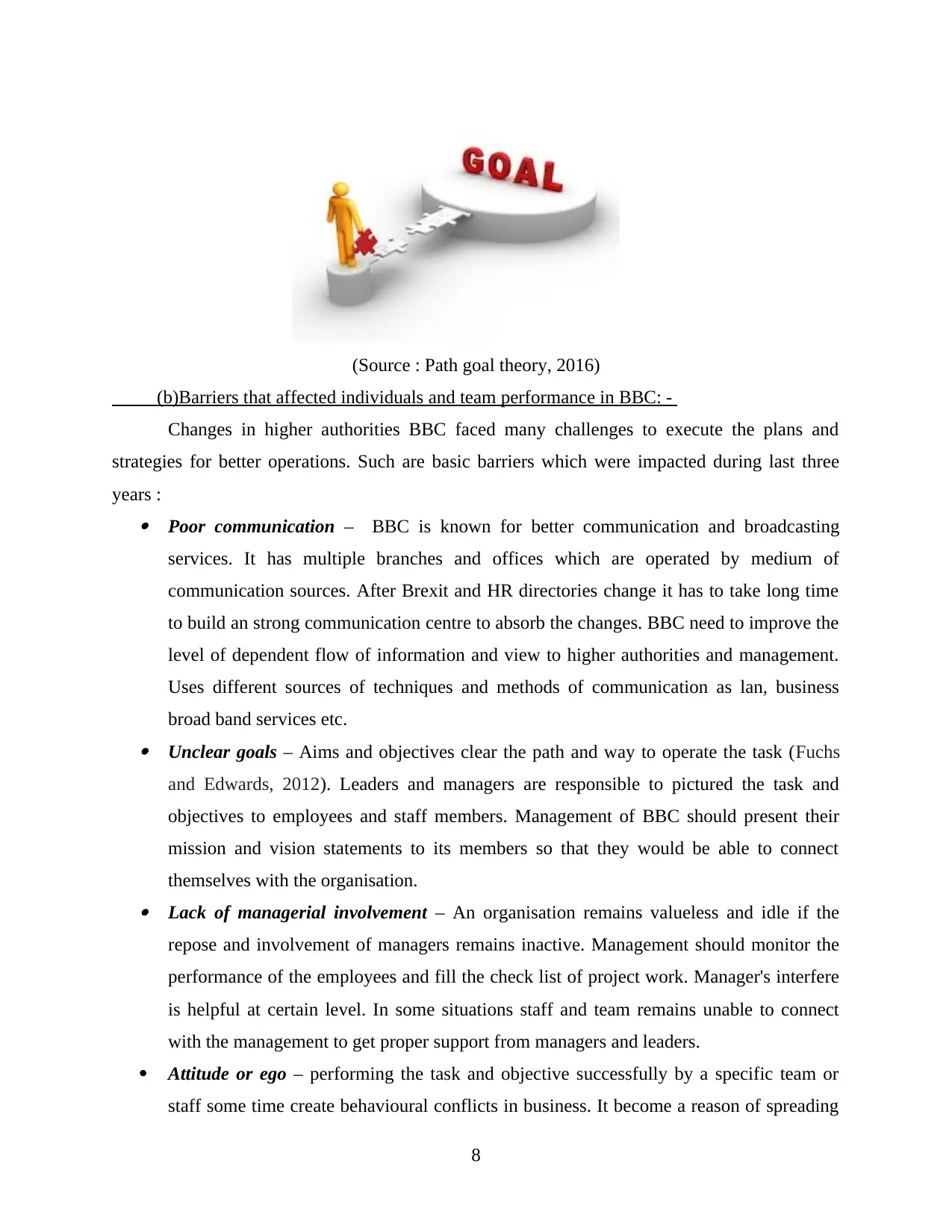
(Source : Path goal theory, 2016)
(b)Barriers that affected individuals and team performance in BBC: -
Changes in higher authorities BBC faced many challenges to execute the plans and
strategies for better operations. Such are basic barriers which were impacted during last three
years : Poor communication – BBC is known for better communication and broadcasting
services. It has multiple branches and offices which are operated by medium of
communication sources. After Brexit and HR directories change it has to take long time
to build an strong communication centre to absorb the changes. BBC need to improve the
level of dependent flow of information and view to higher authorities and management.
Uses different sources of techniques and methods of communication as lan, business
broad band services etc. Unclear goals – Aims and objectives clear the path and way to operate the task (Fuchs
and Edwards, 2012). Leaders and managers are responsible to pictured the task and
objectives to employees and staff members. Management of BBC should present their
mission and vision statements to its members so that they would be able to connect
themselves with the organisation. Lack of managerial involvement – An organisation remains valueless and idle if the
repose and involvement of managers remains inactive. Management should monitor the
performance of the employees and fill the check list of project work. Manager's interfere
is helpful at certain level. In some situations staff and team remains unable to connect
with the management to get proper support from managers and leaders.
Attitude or ego – performing the task and objective successfully by a specific team or
staff some time create behavioural conflicts in business. It become a reason of spreading
8
(b)Barriers that affected individuals and team performance in BBC: -
Changes in higher authorities BBC faced many challenges to execute the plans and
strategies for better operations. Such are basic barriers which were impacted during last three
years : Poor communication – BBC is known for better communication and broadcasting
services. It has multiple branches and offices which are operated by medium of
communication sources. After Brexit and HR directories change it has to take long time
to build an strong communication centre to absorb the changes. BBC need to improve the
level of dependent flow of information and view to higher authorities and management.
Uses different sources of techniques and methods of communication as lan, business
broad band services etc. Unclear goals – Aims and objectives clear the path and way to operate the task (Fuchs
and Edwards, 2012). Leaders and managers are responsible to pictured the task and
objectives to employees and staff members. Management of BBC should present their
mission and vision statements to its members so that they would be able to connect
themselves with the organisation. Lack of managerial involvement – An organisation remains valueless and idle if the
repose and involvement of managers remains inactive. Management should monitor the
performance of the employees and fill the check list of project work. Manager's interfere
is helpful at certain level. In some situations staff and team remains unable to connect
with the management to get proper support from managers and leaders.
Attitude or ego – performing the task and objective successfully by a specific team or
staff some time create behavioural conflicts in business. It become a reason of spreading
8
Paraphrase This Document
Need a fresh take? Get an instant paraphrase of this document with our AI Paraphraser
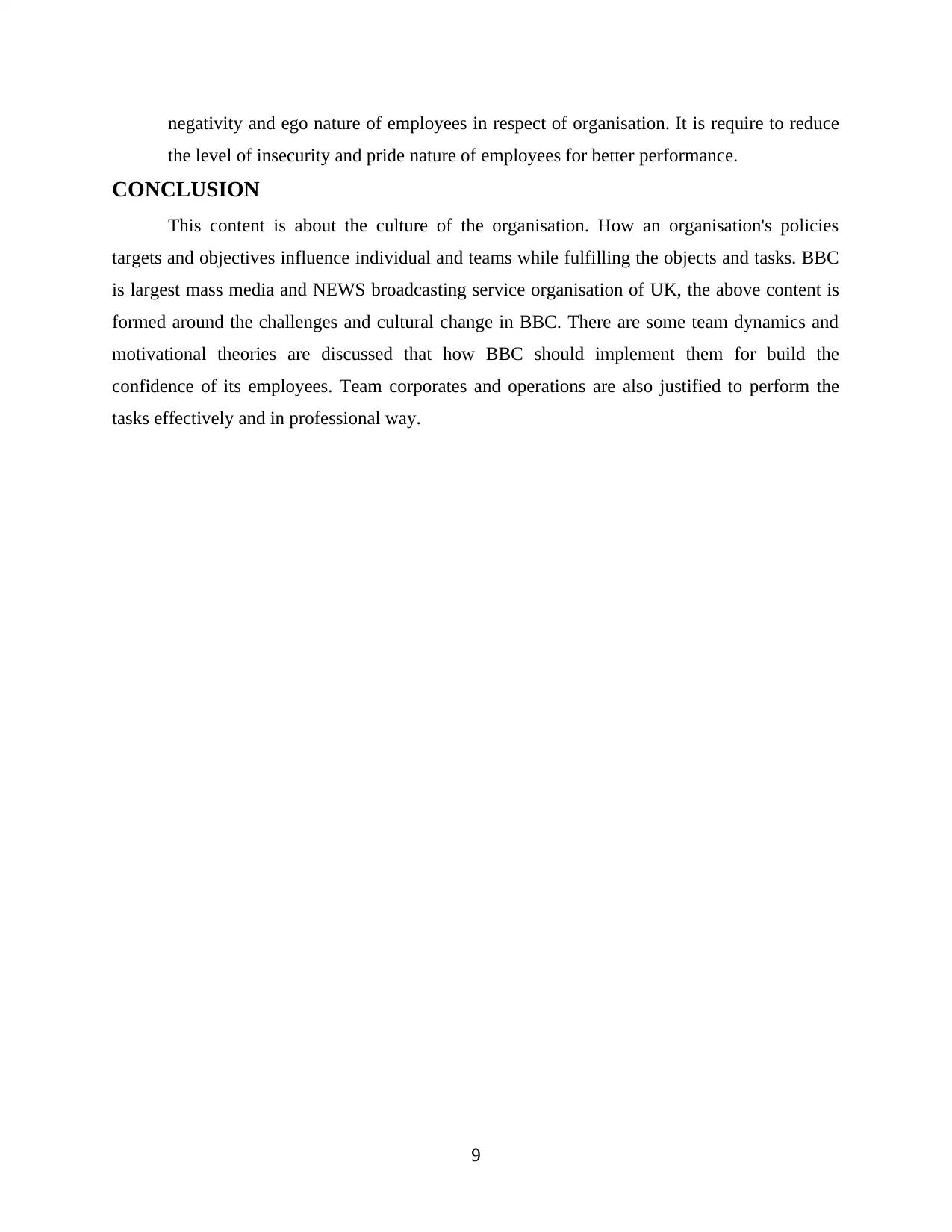
negativity and ego nature of employees in respect of organisation. It is require to reduce
the level of insecurity and pride nature of employees for better performance.
CONCLUSION
This content is about the culture of the organisation. How an organisation's policies
targets and objectives influence individual and teams while fulfilling the objects and tasks. BBC
is largest mass media and NEWS broadcasting service organisation of UK, the above content is
formed around the challenges and cultural change in BBC. There are some team dynamics and
motivational theories are discussed that how BBC should implement them for build the
confidence of its employees. Team corporates and operations are also justified to perform the
tasks effectively and in professional way.
9
the level of insecurity and pride nature of employees for better performance.
CONCLUSION
This content is about the culture of the organisation. How an organisation's policies
targets and objectives influence individual and teams while fulfilling the objects and tasks. BBC
is largest mass media and NEWS broadcasting service organisation of UK, the above content is
formed around the challenges and cultural change in BBC. There are some team dynamics and
motivational theories are discussed that how BBC should implement them for build the
confidence of its employees. Team corporates and operations are also justified to perform the
tasks effectively and in professional way.
9
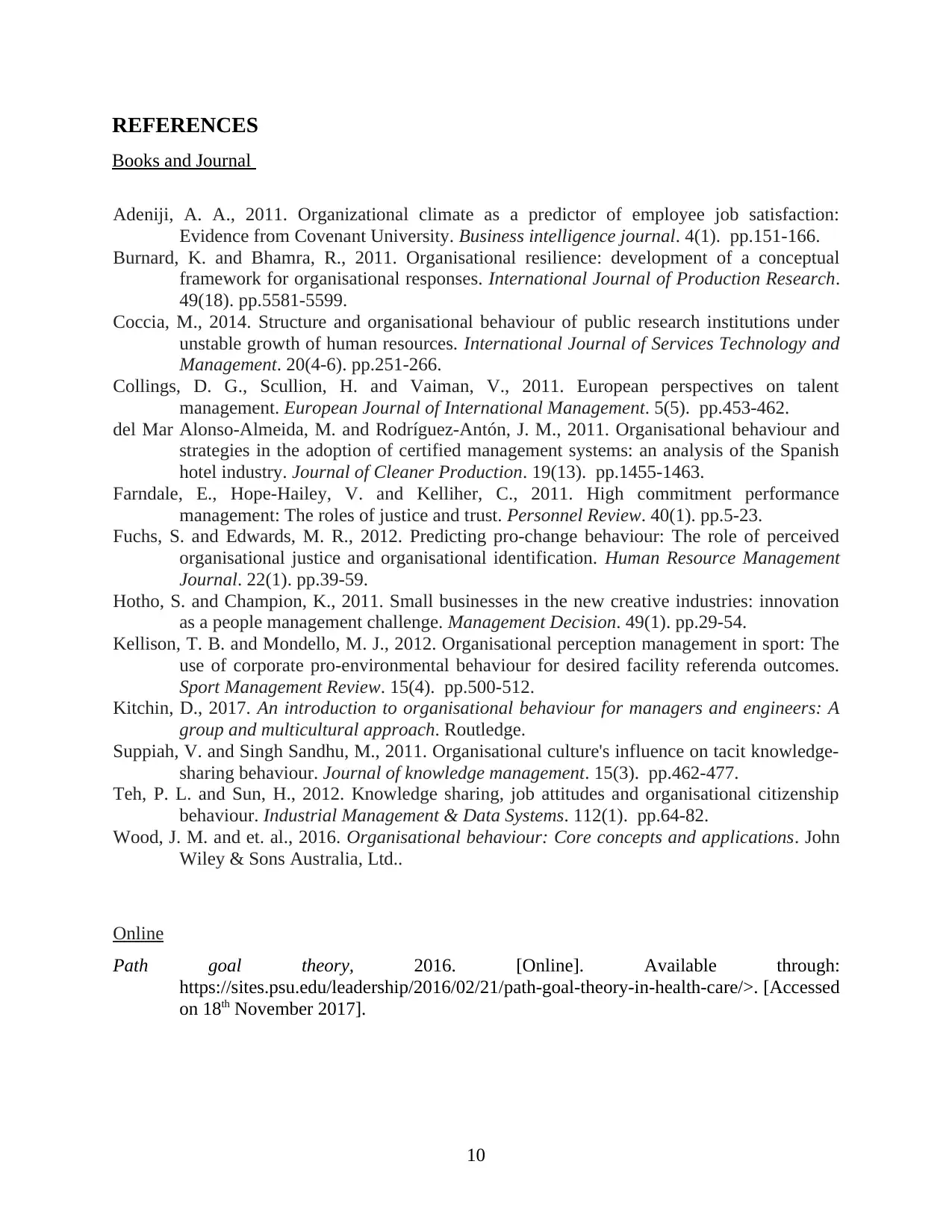
REFERENCES
Books and Journal
Adeniji, A. A., 2011. Organizational climate as a predictor of employee job satisfaction:
Evidence from Covenant University. Business intelligence journal. 4(1). pp.151-166.
Burnard, K. and Bhamra, R., 2011. Organisational resilience: development of a conceptual
framework for organisational responses. International Journal of Production Research.
49(18). pp.5581-5599.
Coccia, M., 2014. Structure and organisational behaviour of public research institutions under
unstable growth of human resources. International Journal of Services Technology and
Management. 20(4-6). pp.251-266.
Collings, D. G., Scullion, H. and Vaiman, V., 2011. European perspectives on talent
management. European Journal of International Management. 5(5). pp.453-462.
del Mar Alonso-Almeida, M. and Rodríguez-Antón, J. M., 2011. Organisational behaviour and
strategies in the adoption of certified management systems: an analysis of the Spanish
hotel industry. Journal of Cleaner Production. 19(13). pp.1455-1463.
Farndale, E., Hope-Hailey, V. and Kelliher, C., 2011. High commitment performance
management: The roles of justice and trust. Personnel Review. 40(1). pp.5-23.
Fuchs, S. and Edwards, M. R., 2012. Predicting pro‐change behaviour: The role of perceived
organisational justice and organisational identification. Human Resource Management
Journal. 22(1). pp.39-59.
Hotho, S. and Champion, K., 2011. Small businesses in the new creative industries: innovation
as a people management challenge. Management Decision. 49(1). pp.29-54.
Kellison, T. B. and Mondello, M. J., 2012. Organisational perception management in sport: The
use of corporate pro-environmental behaviour for desired facility referenda outcomes.
Sport Management Review. 15(4). pp.500-512.
Kitchin, D., 2017. An introduction to organisational behaviour for managers and engineers: A
group and multicultural approach. Routledge.
Suppiah, V. and Singh Sandhu, M., 2011. Organisational culture's influence on tacit knowledge-
sharing behaviour. Journal of knowledge management. 15(3). pp.462-477.
Teh, P. L. and Sun, H., 2012. Knowledge sharing, job attitudes and organisational citizenship
behaviour. Industrial Management & Data Systems. 112(1). pp.64-82.
Wood, J. M. and et. al., 2016. Organisational behaviour: Core concepts and applications. John
Wiley & Sons Australia, Ltd..
Online
Path goal theory, 2016. [Online]. Available through:
https://sites.psu.edu/leadership/2016/02/21/path-goal-theory-in-health-care/>. [Accessed
on 18th November 2017].
10
Books and Journal
Adeniji, A. A., 2011. Organizational climate as a predictor of employee job satisfaction:
Evidence from Covenant University. Business intelligence journal. 4(1). pp.151-166.
Burnard, K. and Bhamra, R., 2011. Organisational resilience: development of a conceptual
framework for organisational responses. International Journal of Production Research.
49(18). pp.5581-5599.
Coccia, M., 2014. Structure and organisational behaviour of public research institutions under
unstable growth of human resources. International Journal of Services Technology and
Management. 20(4-6). pp.251-266.
Collings, D. G., Scullion, H. and Vaiman, V., 2011. European perspectives on talent
management. European Journal of International Management. 5(5). pp.453-462.
del Mar Alonso-Almeida, M. and Rodríguez-Antón, J. M., 2011. Organisational behaviour and
strategies in the adoption of certified management systems: an analysis of the Spanish
hotel industry. Journal of Cleaner Production. 19(13). pp.1455-1463.
Farndale, E., Hope-Hailey, V. and Kelliher, C., 2011. High commitment performance
management: The roles of justice and trust. Personnel Review. 40(1). pp.5-23.
Fuchs, S. and Edwards, M. R., 2012. Predicting pro‐change behaviour: The role of perceived
organisational justice and organisational identification. Human Resource Management
Journal. 22(1). pp.39-59.
Hotho, S. and Champion, K., 2011. Small businesses in the new creative industries: innovation
as a people management challenge. Management Decision. 49(1). pp.29-54.
Kellison, T. B. and Mondello, M. J., 2012. Organisational perception management in sport: The
use of corporate pro-environmental behaviour for desired facility referenda outcomes.
Sport Management Review. 15(4). pp.500-512.
Kitchin, D., 2017. An introduction to organisational behaviour for managers and engineers: A
group and multicultural approach. Routledge.
Suppiah, V. and Singh Sandhu, M., 2011. Organisational culture's influence on tacit knowledge-
sharing behaviour. Journal of knowledge management. 15(3). pp.462-477.
Teh, P. L. and Sun, H., 2012. Knowledge sharing, job attitudes and organisational citizenship
behaviour. Industrial Management & Data Systems. 112(1). pp.64-82.
Wood, J. M. and et. al., 2016. Organisational behaviour: Core concepts and applications. John
Wiley & Sons Australia, Ltd..
Online
Path goal theory, 2016. [Online]. Available through:
https://sites.psu.edu/leadership/2016/02/21/path-goal-theory-in-health-care/>. [Accessed
on 18th November 2017].
10
⊘ This is a preview!⊘
Do you want full access?
Subscribe today to unlock all pages.

Trusted by 1+ million students worldwide
1 out of 13
Related Documents
Your All-in-One AI-Powered Toolkit for Academic Success.
+13062052269
info@desklib.com
Available 24*7 on WhatsApp / Email
![[object Object]](/_next/static/media/star-bottom.7253800d.svg)
Unlock your academic potential
Copyright © 2020–2026 A2Z Services. All Rights Reserved. Developed and managed by ZUCOL.





